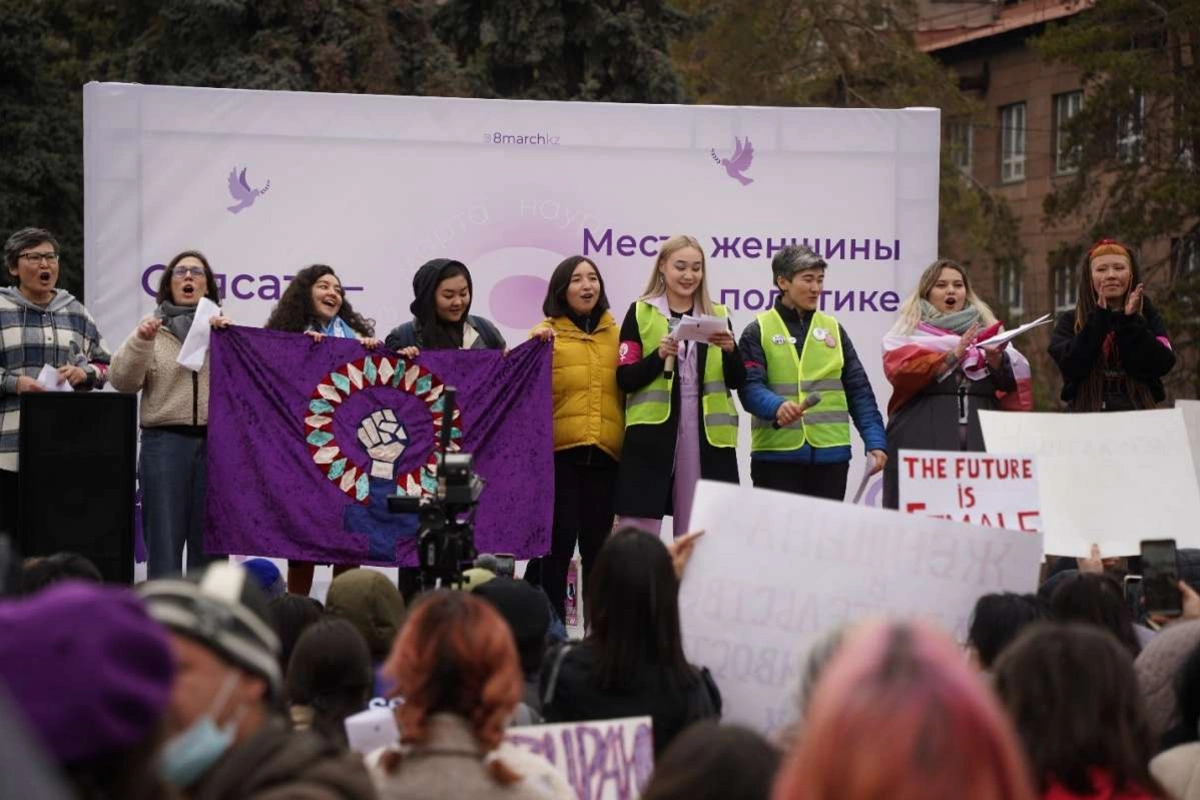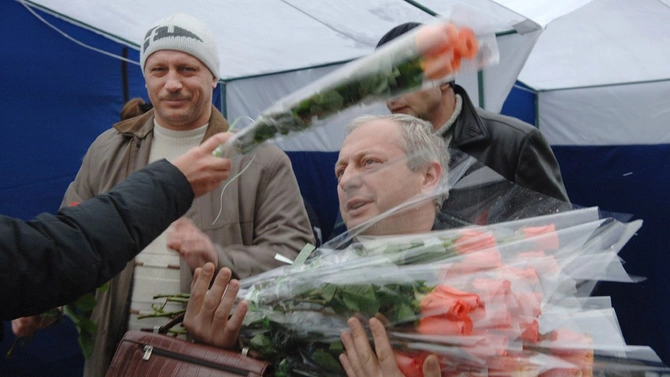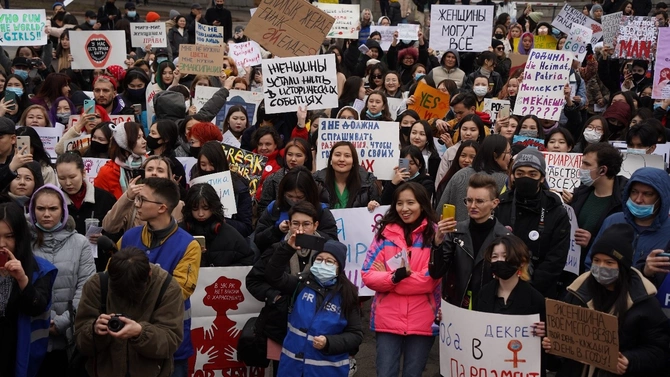
In post-Soviet countries like Kazakhstan, International Women's Day is marked each year by near-mandatory gifts of flowers, but is this all it's meant to be? Leila Mekhdiyeva shines some light on the good, the bad, and the ugly of March 8.
Meeting in support of women's rights in Almaty, Kazakhstan, March 8, 2022. Image: Vladimir Tretyakov
If you ever find yourself in one of the former Soviet republics on March 8, you might be surprised by how seriously locals take the celebration of International Women’s Day.
Women usually prepare well in advance: nails and hair done, outfit chosen. Men, in turn, need to prepare for it - financially! Just as women feel they must look their best, men are expected to gift presents and flowers to pretty much every woman in their life.
Indeed, March 8 is so important that it is a public holiday in 12 post-Soviet countries. It’s often marked a day or two in advance at work or school to ensure that nobody misses out. No lady gets away without receiving their bouquet - or at least a rose.
This parade of women with flowers and men happily proclaiming tales of women’s fragility couldn’t be further from the perception of International Women’s Day elsewhere in the world. Yet, ironically enough, the very reason this day even exists is strongly linked to the former Soviet Union, the socialist movement of the early 20th century, the Russian Revolution of 1917, and early feminism.
Back in 1908, 15,000 women joined a march in New York City demanding better pay, the right to vote, and shorter working hours. Two years later, at a second International Working Women’s Conference in Copenhagen, Clara Zetkin, a leader of the Social Democratic Party’s “Women's Office” in Germany, proposed an annual International Women’s Day (IWD). While Zetkin’s idea was for a day that would be celebrated worldwide, interest remained limited until March 8,[1] 1917, when women in the Russian Empire chose the symbolic date to launch a strike demanding “bread and peace.” This snowballed into a more significant protest against famine, the war, and the tsarist regime. It could be seen as the spark that set off the Revolution of 1917, resulting in the tsar’s abdication and, ultimately, in women being granted their right to vote.

Women's demonstration for bread and peace, Petrograd, Russia, March 8, 1917. Image: Wikimedia Commons
During the decades that followed, gender equality was a trademark of the USSR, along with the “one nation” idea of cosmopolitanism. March 8 was widely celebrated throughout the communist countries, becoming a public holiday in the USSR in 1965. Elsewhere, IWD’s worldwide celebration only started in 1975 (when United Nations marked it for the first time), and in much of the world, the idea never gained widespread traction.
After 1991, the post-Soviet countries inherited the tradition of celebrating IWD from their communist past. But although the history and significance of this day are still explained in schools, and Clara Zetkin’s name is not forgotten, somehow, over recent years, this celebration of women’s equality morphed into a parade of women decked with flowers while giving men having another opportunity to tell misogynistic jokes.
Former President of Kazakhstan Nursultan Nazarbayev did the latter so often that there was enough material to make a video compilation of his annual sexist jokes. “They say men invented kissing to make women stop talking,” goes one of Nazarbayev’s jokes. Around him are women, apparently beaming with joy and approval while laughing and applauding.
Russian President Vladimir Putin is also known for his questionable sense of humour. One such case was him joking that since he is not a woman, he doesn’t have bad days. Then there was his 2006 rape joke. According to a BBC reporter, he apparently quipped at the end of his meeting with then-Israeli Prime Minister Ehud Olmert: "Greetings to your president! What a mighty man he turns out to be! He raped 10 women... He surprised us all - we all envy him!" At the time, the then-President of Israel, Moshe Katsav, was facing rape allegations. He was later found guilty and sentenced to seven years in prison.
Surely, one might say, there is no harm in gifting women flowers and celebrating womanhood and femininity in general. And perhaps, that today’s feminist values are trying to change the values of yesterday. But the holiday was never meant to be what it has become in post-Soviet societies. It was meant to be an opportunity for women to talk about pressing issues that truly mattered to them, whether the gender pay gap or domestic abuse. Yet, especially the latter is egregiously overlooked by authorities in most post-Soviet countries.

Men buying flowers for March 8, International Women’s Day, flower market Kitezh, Moscow, 2008 Image: RIA Novosti/Wikimedia Commons
For example, since 2017, cases of domestic violence have been decriminalized in Russia if they do not result in hospital treatment for the victim. Even where the victim is hospitalized, a first-time offender will only be liable for a fine of 5000 rubles (US$66).
Also, in 2017, former President of Kazakhstan Nursultan Nazarbayev signed amendments to Kazakhstan’s criminal code. The result was similar to the Russian example and decriminalized “intentional infliction of light bodily harm” caused by domestic disputes. According to Human Rights Watch, Kazakh authorities do little or nothing to punish abusers while advising victims to drop any charges against their attackers. They also fail to inform women of possible shelters and protective services.
While under-reported in official statistics, cases of domestic violence are more frequently known about and discussed thanks to social media. The case of Margarita Gracheva, whose husband cut off both her arms, shocked the whole internet. The case was particularly tragic in that just five days before the incident, she went to the police after being threatened with a knife. However, the police took no action to prevent the appalling crime.
Luckily, there is still hope for the future of the feminist movement in post-Soviet countries. Millennials and Gen-Z women are much more aware of the issues and hypocrisy in the patriarchal societies they live in. For example, in Almaty, Kazakhstan’s biggest city, around 100 activists gathered on February 5 this year to demand the possibility of organizing a march for women’s rights on March 8 following the earlier refusal of permits by the akimat (Kazakh mayor’s office), which claimed that there were no available spots. Women protested with posters saying, “Marsh bolsyn!” (Let the march be!) and other slogans, and, remarkably, the akimat finally relented and allowed the march a chance to happen this year.

Peaceful rally in defense of women's rights in Almaty, Kazakhstan, March 8, 2022. Image: Vladimir Tretyakov
Such moves towards supporting marches for women’s rights are only recent and somewhat limited, but that they are happening at all is inspiring. Who knows, maybe soon, more and more women will take to the streets demanding their voices be heard, fighting sexual harassment and inequality. Maybe one day, we will see the number of women ready to stand up for their rights outnumbering those who accept the token flowers of Women’s Day as a stand-in for female empowerment.
[1] February 28 according to the Julian calendar
Share on social media